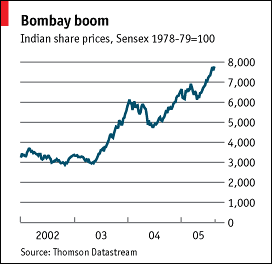Indian property
 Another boom
Another boomAug 25th 2005 MUMBAI From The Economist print edition
Why foreigners are so keen on India's property market
THIS year's monsoon may have brought terrible suffering to Mumbai, but nothing seems to dampen the property market in India's commercial capital. At a recent government auction, the prime eight-acre (3.2-hectare) site of the former Elphinstone textile mill was bought for 4.4 billion rupees ($101m) by Indiabulls Real Estate, a subsidiary of Indiabulls, a local securities broker firm. In recent months Mumbai has seen the pricey sales of five large pieces of land on which its now defunct textile mills once stood; Indiabulls Property, a related company, snapped up another of these, Jupiter Mills, in May.
Like those of many other countries, India's property market is booming. The difference is that India's was long out of bounds to institutional investors, particularly foreigners. That appears to be changing: 60% of Indiabulls Property is owned by Farallon Capital Management, a San Francisco hedge fund. This month Indiabulls closed a $150m offering of global depository receipts to fund its recent property acquisitions; Fidelity, Goldman Sachs and Merrill Lynch were large investors.
Two forces lie behind the boom. First, investors are betting on the consumption-driven growth of India's economy that is spawning glitzy shopping malls, entertainment centres, multiplexes and luxury hotels. Some reckon that the retail trade will soon be opened to foreign investment and that the likes of Wal-Mart will fuel the demand for commercial property. The second factor is India's emergence as a hub for global outsourcing. Last month GE Commercial Finance, General Electric's investment arm, said it would put $63m into a $350m fund sponsored by Ascendas, a property developer and asset manager from Singapore. The fund will finance information-technology parks; the idea is to make money from capital gains and leases. GE is already a large investor in business-process outsourcing in India; this marks its entry into commercial property.
The immediate attraction for foreigners is the easing of restrictions on direct investment in the property market in February this year. Foreign companies can set up subsidiaries or joint-ventures to develop property, provided that their money is locked in for three years and that plots are of at least a minimum size.
Locals have also joined in. HDFC, India's largest mortgage lender, and State Bank of India, the largest commercial bank, closed a seven-year, 10 billion rupee property fund for Indian investors in July. ICICI Venture, a subsidiary of another big bank, is raising a $250m venture fund to finance commercial and residential property development.
However, India's property market remains unorganised and underdeveloped. This creates risks for investors. In the absence of clear title to property, the risk of litigation is high, says Gagan Banga, a director at Indiabulls. The Elphinstone property is mired in a high-court action because the previous private owner challenged its nationalisation. And for those who invest in India via real estate investment trusts, there are no rules on the marking of their stakes to market or on whether they must pay stamp duty on transactions, says Renuka Ramnath, who heads ICICI Venture.
Also, as property prices have shot up, by over 20% in places in recent months, some give warning of a bubble. Deepak Parekh, chairman of HDFC, says that prices in Gurgaon, a satellite town outside Delhi that has attracted many outsourcing companies, are now falling, having doubled in the past year. The central bank raised the risk weight assigned by banks to their loans on commercial property to 125% from 100% in late July.
For some, the dizzying rise in Indiabulls' shares is an uncomfortable reminder of the dotcom boom. The five-year-old company, founded by three smart engineers and in which Lakshmi Mittal, a steel magnate, was an early investor, floated shares in September at 19 rupees apiece. They now trade at around 225 rupees, having topped 250 this month. The company's market capitalisation has risen from 2 billion rupees to 30 billion. Perhaps it is time to get those seatbelts on.